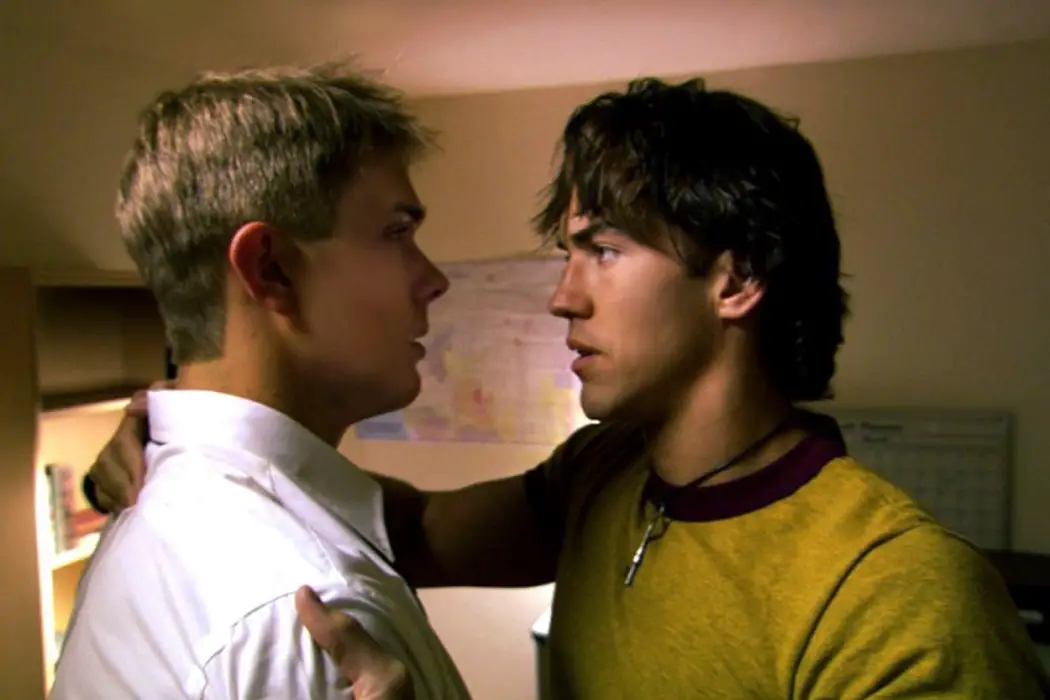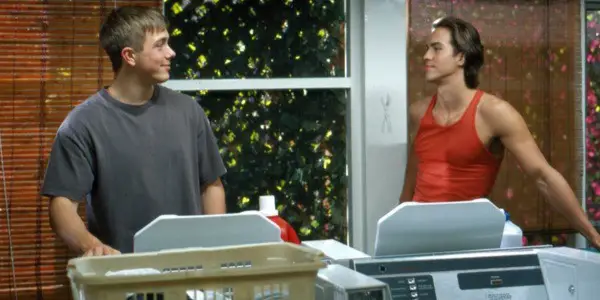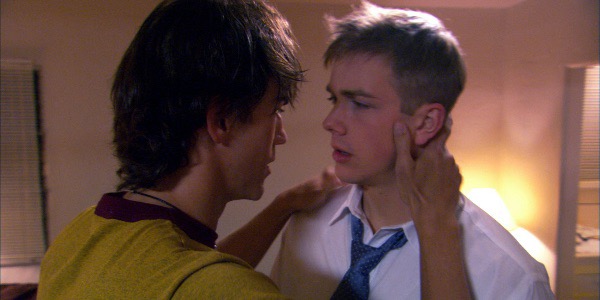Queerly Ever After #37: LATTER DAYS (2003)

Amanda Jane Stern is an actress, writer, and director from…
Queerly Ever After is a bi-monthly column where I take a look at LGBT+ films that gave their characters a romantic happily-ever-after. There will be spoilers. Also, don’t forget to buy your Queerly Ever After merch right here.
It is also important that I include a content warning for suicide attempts in this article.
In this romantic dramedy, Christian (Wes Ramsey) a promiscuous young gay man, makes a bet with his friends Julie (Rebekah Johnson), Andrew (Khary Payton), and Traci (Amber Benson) that he can seduce one of the four Mormon missionaries who just moved into his apartment complex. As proof of his successful seduction, he promises to bring back the special underwear of his Mormon conquest.

Of course, like other movies of this era that revolve around one character making a bet he or she can woo another, Christian ends up falling in love with his target, Elder Aaron Davis (Steve Sandvoss), who has been harboring the secret of his sexuality for years. The film’s writer/director C. Jay Cox, spent some of his young adulthood as a Mormon missionary, before coming out of the closet and leading a playboy lifestyle in West Hollywood.
Religion and Sexuality
A big focus of this film is of course the Mormon Church’s negative stance on homosexuality. Aaron has spent his life hiding in the closet because he knows coming out could get him excommunicated from the church and disowned by his family. Something this movie didn’t always excel at was properly toeing the line between comedy and drama. A relationship started on a bet is inherently morally wrong, throw in the extra layer that outing Christian could actually have grave consequences for him, and that gives it an even more sinister tone. Yes, it’s all well and good that Christian actually ends up falling for Aaron, but he never really has to face the consequence of his actions. It makes me wonder, was the bet even a necessary plot point? Aaron already knew he was gay, the movie could easily have allowed two men to organically fall in love without the plot contrivance. After all, they were neighbors who kept running into each other and growing closer. Oftentimes, the movie itself seems to forget about the bet.
As I mentioned, Christin never really faces any consequences, but Aaron certainly does. After the two are caught kissing by his fellow missionaries (Joseph Gordon-Levitt, Rob McElhenney, and Dave Power) Aaron is sent home in shame. It is at this point that the movie exits comedy territory and enters fully into drama. Now a pariah, Aaron becomes depressed at home.

His mother, Gladys (Mary Kay Place), can barely look at him and refuses to put him on the phone when Christian calls, and his father, Farron (Jim Ortlieb), a high-ranking church member, can’t even stand to be in the same room as him. To put it succinctly, his parents are awful people. After one particularly bad argument with his mother, Aaron decides he’s had enough and takes a straight razor to his wrists. After his failed suicide attempt, his parents send him off to some sort of rehab facility/conversion therapy clinic where he is forced to take ice baths and do menial labor. Of course, he eventually escapes and is reunited with Christian.
West Hollywood
One thing I did appreciate about this movie is that both Christian and Aaron had lives outside of their budding romance. Each had their own friends and goals. Christian, as mentioned in the opening paragraph, has three close friends in the film: Julie, an aspiring singer who is also his roommate, Andrew, and Traci. All four of them are coworkers at a restaurant owned by the supportive Lila (Jacqueline Bisset). These characters, to Cox‘s credit, are all well fleshed-out with personalities of their own. Julie is a determined singer/songwriter working hard to get a record deal, which she does eventually succeed at, Traci is a New York transplant and aspiring actress, who hates LA, but she also hated NYC, and Andrew is an HIV-positive gay man who in his spare time runs a meal service for people living with AIDS. On the other side, Aaron’s fellow missionaries are not as fleshed-out. In fact, the only other one who is really given a character is Gordon-Levitt‘s Elder Ryder, who is an arrogant, hotheaded jerk.
In Conclusion: Latter Days
The movie doesn’t always know whether it wants to be a drama or a comedy, but it doesn’t really succeed at being both. Also, at an hour and 47 minutes, it often feels longer than that, as if the film didn’t have enough plot to sustain itself, despite there actually being quite a bit of plot. It’s not a bad movie, but it’s also not great. If you’re feeling nostalgic for early oughts movies like She’s All That, then this is for you.
Latter Days came out in the USA on January 30, 2004. For all other release dates, see here.
Watch Latter Days
Does content like this matter to you?
Become a Member and support film journalism. Unlock access to all of Film Inquiry`s great articles. Join a community of like-minded readers who are passionate about cinema - get access to our private members Network, give back to independent filmmakers, and more.
Amanda Jane Stern is an actress, writer, and director from New York City. She received her BA in Film, Television & Interactive Media and Theater Arts from Brandeis University. She loves regaling whomever will listen with her endless lists of fun facts and knowledge of film history. Follow her on twitter and instagram @amandajanestern













